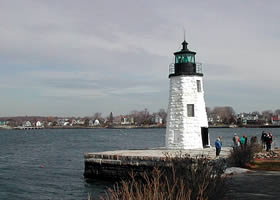The Early Years
 The National Wildlife Federation (NWF) was founded in 1936 and the Rhode Island Wildlife Federation (RIWF) was founded in 1938.
The National Wildlife Federation (NWF) was founded in 1936 and the Rhode Island Wildlife Federation (RIWF) was founded in 1938.
Dr. Donald Zinn, URI Professor of Zoology at URI from the 1940s until the 1980s, was president of the National Wildlife Federation for two years in the late 1950s. In 1991, about a year before he died, Dr. Zinn mailed ECRI a rolled-up, large photo of the 1951 RIWF's Annual Meeting which took place in the Providence Biltmore Ballroom. In this picture, everyone is seated at their tables looking at the camera. The photo was framed and is mounted on the wall of the Environment Council of Rhode Island's (ECRI) office.
NWF is a mix of hunting and fishing outdoors folks and policy directed environmental advocates. At the time of the first Earth Day in 1970, NWF and some folks in RIWF thought degraded environmental conditions such as polluted rivers and poorly managed waste sites warranted that RIWF should substantively address state environmental policymaking. Other folks in RIWF thought the organization should not become involved in environmental policy and politics. NWF decided at this time that affiliates should be effective environmental policy advocates as a criterion to be a state affiliate.
Under the stewardship of Alfred Hawkes, executive director of the Audubon Society of RI from 1958 to 1991, ECRI was created as a Rhode Island nonprofit corporation in 1972. RIWF was disaffiliated from NWF, and ECRI became the state affiliate of NWF. During this time, NWF was the conservation organization with the largest membership in the world, approximately five to six million members. In the mid-1970's, NWF staff size approximately equaled the staff size of the nine next largest national environmental organizations combined, and NWF had state affiliates in all fifty states.
The 1970s
For ECRI, water issues were a focus in the early 1970's, but fighting the construction of a nuclear power plant in Charlestown soon became the focus in the mid-1970's. Most funds to fight construction of the nuclear power plant were handled by ECRI. The nuclear power plant project was defeated by an act of the General Assembly in 1977. The RI Department of Environmental Management (DEM) was formed in 1976 bringing together a variety of smaller agencies. William Harsch was the first director. In the late 1970's, the greater Providence sewer system became the focus. In 1980, funds raised by Trudy Coxe and others at Save the Bay were processed by ECRI to pass the largest bond issue in state history, $86 million, to create and finance the Narragansett Bay Commission (NBC.) Louise Durfee, who later became DEM Director under Governor Sundlun in the early 1990s, was the attorney for NBC who negotiated the takeover of the system from the City of Providence to NBC in the early 1980s. ECRI also worked during the 1980s with DEM Director Robert Bendick, who served under both Governors Garrahy and Diprete, to improve enforcement and to revitalize state parks and beaches.
The 1980s
In the early and mid-1980s, ECRI addressed state water supply policy by convincing Governor Garrahy in 1984 that a major study of the state's water supply was needed, particularly to determine if the Big River Reservoir should be built. In 1988, toward the completion of the study, the EPA vetoed the Big River Reservoir project for twenty years stating that the wetlands loss was not warranted given the state's population size and realistic projections of population growth. The RI Water Resources Board, principal sponsor of the Big River Reservoir, originally projected the state population to be 1,300,000 in 2000. The state population was 1,047,000 in 2000.
In the late 1980s, ECRI addressed state solid waste policy. Only Rhode Island and New Hampshire did not have bottle bills on the northeastern section of the North American continent. The other New England states, New York and the eastern Canadian provinces did have returnable bottle laws. In 1985, ECRI did manage to get a bottle bill through the House of Representatives, but could not win over the Senate leadership. Determining the right mix of recycling, landfilling, and incineration became the major policy issue. No state yet had mandatory curbside recycling - parts of Ontario province did. The environmental community became split between whether to support having one state incinerator or not. ECRI was at the forefront of negotiating having Rhode Island be the first state to adopt mandatory curbside recycling. Some folks agreed not to fight one incinerator to bring about this achievement. Rhode Island did become the first state to adopt mandatory curbside recycling. After this occurred, about half the environmental community successfully persisted in convincing the General Assembly to ban municipal waste incineration in Rhode Island and set a seventy percent recycling goal for the state.
In the late 1980s and early 1990s, ECRI also addressed DEM reorganization and fighting severe state budget cutbacks at DEM by Governor Sundlun. ECRI and other parties successfully convinced the General Assembly to fund a DEM reorganization study at the $150,000 level and then passed a DEM reorganization bill in June, 1990, but the Sundlun Administration, elected in November, 1990, failed to implement the legislation. In regard to DEM budget cutbacks, Governor Sundlun wanted to set the state general fund budget for DEM at under $12 million in 1993 and DEM Director Louise Durfee resigned in protest. The state general fund contribution to the DEM budget in 2002 is $32 million.
The 1990s
In the 1990s, lead paint poisoning prevention; auto emissions testing; municipal level comprehensive planning; zoning enabling legislation modernization; combined sewer overflows; bay, coastal and inland river management; open space protection; and the separation of powers were major issues.
In 1993, DEM began honoring individuals who through uncommon effort “immeasurably advanced the preservation, protection, and enhancement of the natural resources of our state” with The Alfred L. Hawkes Award for Conservation and Environmental Accomplishment. In the words of John Campanini, Providence city forester and the Alfred L. Hawkes Award honoree for 1999:
"Mr. Hawkes is a true environmental colossus whose lifelong work on behalf of wildlife protection and conservation will continue to benefit present and future generations of Rhode Islanders for many years to come. I am humbled to think that through this award, in some small way, I will forever be linked to this great man and his wonderful work."
Random Notes
- ECRI held its first Dinner-Auction fundraiser in the spring of 1986 and conducted eleven consecutive annual Dinner-Auctions through 1997. The highest attendance was in 1990 with 280 people attending at the Johnson and Wales Hospitality Center in Cranston in celebration of the 20th Anniversary of Earth Day.
- ECRI was NWF's Affiliate of the Year in 1990 during Eugenia Marks' presidency.
- ECRI began sponsoring the Senator John H. Chafee Conservation Awards in the spring of 2000, and held its fifteenth and final Chafee Awards event in 2014. VP for Development Jack Schempp lead event planning through its entire run. The Annual Meeting, held the first Monday in June each year, is currently serving as the yearly fundraiser.
- ECRI is a 501 (c) 4 non-profit organization that can perform unlimited lobbying and can be involved in elections. In 1994 and 1995, ECRI seriously deliberated (c) 3 versus (c) 4 status, and member organizations, many with (c) 3 status, determined they wanted ECRI to remain a (c) 4 thus being able to lobby and be involved in elections in an unrestricted manner.
- In 1991, ECRI leaders created the ECRI Education Fund (EdFund) to be a 501 (c) 3 non-profit organization to conduct research and education and apply for government and foundation grants to support ECRI policy activities. The EdFund received 501(c) 3 provisional status in 1993 and permanent status in 1998 after a five year review. From 1995 to 2000, the EdFund co-sponsored Earth Day with RIDEM. In 2000, over 15,000 people attended the state Earth Day festival at Goddard State Park and over $40,000 was raised and expended. The EdFund terminated co-sponsorship of Earth Day with DEM after the 2000 event due to philosophical differences.
- In 1999, the EdFund received and managed an EPA Environmental Education grant to address environmental education coordination in Rhode Island. The grant identified twenty organizations in Rhode Island that have staff support for environmental education services to the state's 330 schools with 12,000 teachers and 160,000 students. This grant also supported the development of the ECRI website.
- ECRI had about five member organizations in 1980, about twenty member organizations in 1990, about forty member organizations in 2000 and currently has about sixty member organizations..
- ECRI met on the first Wednesday night of each month from 1982 until the early 2000s when it switched to Monday’s to avoid meeting during legislative sessions. For many years it met at the Audubon Society of RI’s headquarters, but now uses space in the Department of Administration building on Smith Hill for its meetings.
-
The Environment Council of Rhode Island has affiliated itself with the National Wildlife Federation since 1972 and uses the connection to influence Rhode Island's Washington delegation and bring global issues into a Rhode Island context.
ECRI Presidents:
2019 – present Priscilla De La Cruz
2018 – 2019 Meg Kerr
2016 - 2018 Jerry Elmer
2013 - 2016 Jamie Rhodes
2010 - 2013 Tricia Jedele
2009 - 2010 Paul Beaudette
2008 - 2009 Denise Parrillo
2006 - 2008 Matt Auten
2003 - 2006 Sheila Dormody
2002 - 2003 Alicia Karpick
2000 - 2002 Jeff Kos
1999 - 2000 Paul Beaudette
1997 - 1999 Kris Stuart
1996 - 1997 Laura Landen
1994 - 1996 Connie McGreavy & Mark Laroche, Co-presidents
1993 - 1994 Molly Clark & Skip Pomeroy, Co-presidents
1992 - 1993 Molly Clark & Jennifer Sheperd, Co-presidents
1989 - 1992 Eugenia Marks
1986 - 1989 Paul Beaudette
1982 - 1986 Guy Lefebvre
1979 - 1982 Maryellen Blount
1972 - 1979 Guided by Alfred Hawkes
* Changes in leadership generally occured at the annual meeting in June of years cited.
